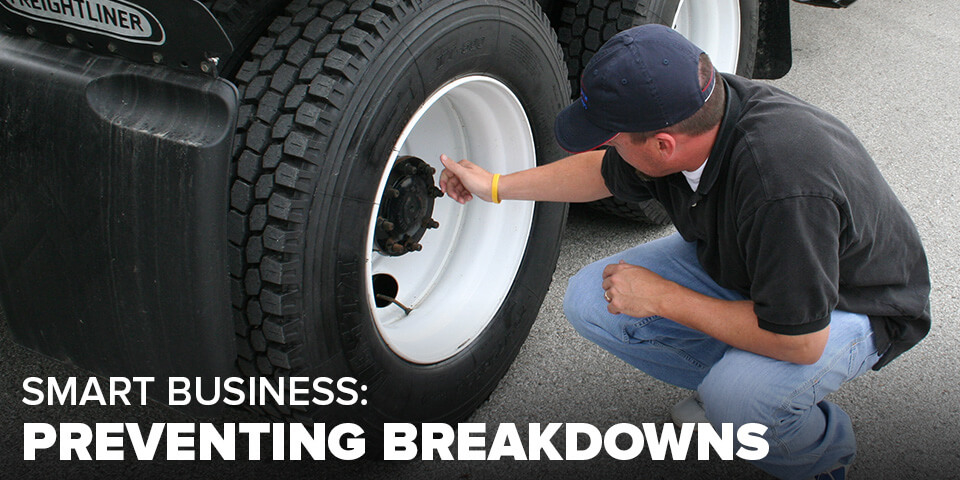
Smart Business: Preventing Breakdowns
As an expedite owner-operator, your truck is a tool that makes you money. So, if it breaks down on the road, you not only have to pay for the repairs but -- with every hour that truck is down -- you also lose revenue. And that can be catastrophic to your business.
How can you more effectively care for your truck to prevent untimely breakdowns -- and protect your financial future?
Follow these three tips.
1. Make daily pre-trip inspections a top priority
"Truck maintenance, in my opinion, begins with the pre-trip inspection. That truck is your tool. If you don't keep that tool 'sharp,' like a saw, it's going to put you on the side of the road and cost you a lot of money," says John Lalonde, expediter sales representative for Fyda Freightliner in Columbus, Ohio.
A key component of pre-trip inspections is checking tire pressure, especially the steer tires on expediter straight trucks where large aftermarket sleepers tend to put extra weight on the truck's front axle.
"It's funny, I'll hear from a guy who complains, 'I can't keep steer tires on this thing for more than 80,000 miles.' But then I'll talk to someone else, and he says, 'I've got 200,000 miles and look at those steer tires, they're still like brand new.' When you dig deeper in both cases, you discover the impact of pre-trip inspections (or the lack of them) on tire life," says Lalonde.
Beyond checking the tires, what should be included in that inspection?
"Walk around the truck and look for anything that might be damaged or loose. Make sure all lights are working, your brakes are o.k., and whether there are any leaks that need to be fixed before they get worse," says Lalonde.
2. Adhere to required service intervals
Consult your owner's manual to become familiar with the manufacturer's required oil change and other service intervals specific to your truck.
"It used to be that you would typically go 12,000 miles before the truck would need an oil change. Now you can go 50,000 miles between oil changes," says Lalonde. "But that doesn't mean you can wait to do everything at 50,000 miles just because that's when you do an oil change. You've still got to service the chassis every 15,000 or 20,000 miles, replace air filters every 15,000 to 20,000 miles, do an alignment every 20,000 or 30,000 miles, and rotate and balance the steer tires. So, you need to look at your manual and make sure you stay on top of everything that needs to be done -- and when."
3. Keep all service records
Following the proper service schedule not only helps you keep your vehicle operating at maximum efficiency, but it also protects you in case there's a major component failure within the warranty period.
Lalonde recalls an incident recently where an owner-operator's truck with 350,000 had blown the engine. It was still under warranty, but the engine manufacturer required the truck owner to provide proof of maintenance before the company would pay for the repair.
"The [manufacturers] have the right to ask," says Lalonde. "They provide an owner's manual telling you when to change your oil and service the truck in accordance with their warranty."
Lalonde says that he gives each of his customers a large, leather-bound three-ring binder to keep in the truck for maintenance record-keeping purposes. Having all the maintenance records in one place, says Lalonde, does two things for the truck owner: first, you can easily access it in case you ever need to prove maintenance was done; and second, it can help with resale value because those records will give the next owner greater peace of mind, especially if the truck is still under warranty.
The Bottom Line
When it comes to preventing truck breakdowns, you can't skimp on maintenance. Says Lalonde: "Your truck is a tool for your business, and if you don't keep that tool in shape, it's not going to generate revenue for you. Drivers who get that, they're the ones constantly working, cleaning, polishing, tightening stuff, and checking on their truck. The drivers who don't, sooner or later, the truck will leave them on the side of the road, and they're not going to be too successful in this business."
